
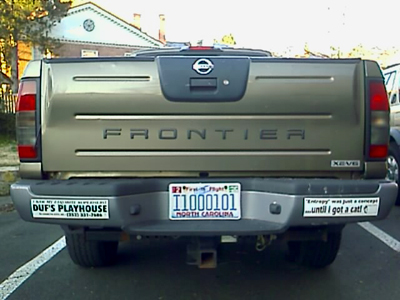 My Truck Bumper Sticker: “Entropy was just a concept… Until I got a cat!” |
After spending the previous two weekends immersing myself in the Science Network’s Beyond Belief 2006 video’s online, watching Richard Dawkins, Ann Druyan, Richard Sloan and other monsters of science discuss science and religion, I was totally psyched for this event. I was also very cognizant of the fact that I hadn’t updated my blog in forever, and I’m really 50% science blogger and %50 political, film critic, and book reviewer… and I don’t even have a comments section on my blog, so there’s no real reader-feedback. Of course, a comments section on this blog would be like nipples on males, pointless. Well, that’s not entirely true, they do feel nice when they get hard no matter your gender and–
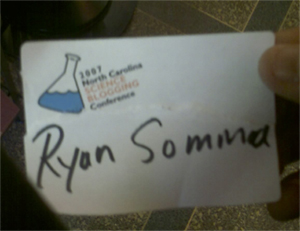 Ryan Somma’s Official Nametag! |
Anyways! Staying jazzed for the event, I updated my blog with my long-procrastinated post on embryonic recapitulation, packed my new Cingular 8525 PDA/Phone/Camera, burned six hours worth of NPR’s Science Friday to keep me energized, and set off for UNC Chapel Hill.
Will Raymond of Citizen Will, who pronounced my blog “e-dio-nexus,” which I realized was probably more valid than my own pronunciation (eye-dio-nexus), but then I’m a reader, not a speaker. Will was very friendly and sociable throughout the various conference sessions, and after checking out his blog, I realized he’s one of those people we’re happy to have in society who acts on their conscience.
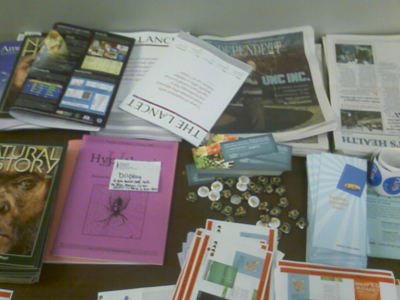 NCSB 2007 Free Stuff |
I didn’t realize until later I was supposed to put colored buttons on my nametag identifying what characteristics brought me to the conference (ie. blogger, educator, scientists, journalist, etc). I’ll be sure to properly label myself next year. The bag of goodies was awesome, and included free copies of nature. The Lancet, American Scientist, The Scientist, Natural History, endeavors, Seed, and a copy of “The Best American Science Writing 2006. All of these magazines are wonderful, and the book is the type of fox-scientist reading I really enjoy.
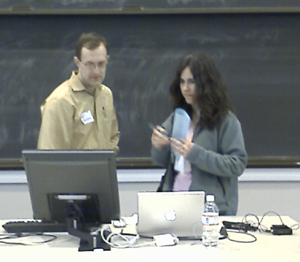 Anton Zuiker |
There was also a 5 DVD set of science reports from PBS’sThe News Hour, which rocks, and free t-shirts for the Public Library of Science, which is “committed to making the world’s scientific and medical literature a freely available public resource.”
Anton Zuiker of mistersugar opened the conference and made the welcoming remarks. He was followed by Bora Zivkovic of A Blog Around the Clock, who continued the introductions with “Science Blogging 101.” Bora has also compiled a collection of the year’s best science blog posts into a book titled “The Open Laboratory.”
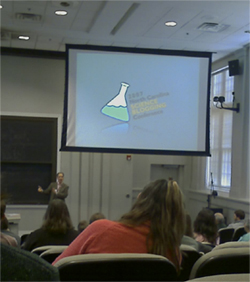 “Promoting public understanding of science” Dr. Hunt Willard |
Dr. Hunt Willard followed with a session titled “Promoting public understanding of science,” where he covered how science writing should strive to get the public to visualize science and explain why science matters. Science issues affect us all, whether we care or not. He brought up a topic recently tingling imaginations online of cloning Neanderthals and what we could learn from them, but then, he asks, what do you do with the Neanderthal once you’re done with it? Send it to a sanctuary like we have for primates? These kinds of complex ethical questions are another means for communicating science. An mp3 of Dr. Willards talk is found here via Audio Activism
Dr. Janet D. Stemwedel of Adventures in Ethics and Science led a discussion on science blogging titled “Adventures in Science Blogging.” Just a few high points of her talk were to cover the strengths of blogs as a medium, more permanent than a conference, quicker feedback than journals, and more back and forth than press releases. She also covered the importance of understanding what your reader’s know, what they want to know, and using blogs to have a conversation and less of a lecture. She ran through a wide variety of intriguingly-titled blog posts from a wide variety of sources, which she has kindly posted to her blog for readers, and her power point presentation can be found here.
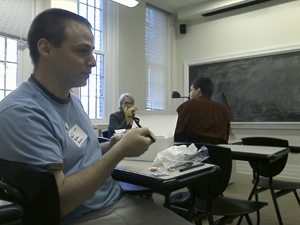 Terrell Russell claimID.com |
Free lunch was sponsored by JMP Software and BlogBurst. I was pleased to find my recent conversion to vegetarianism didn’t leave me hanging. Luck put me in the vicinity of one Terrell Russell, a PhD Student at SILS, co-founder of claimID.com and the creator of Cloudalicious, where you can visualize how tagclouds change over time. I couldn’t help but find myself drawn into a conversation he was having with another attendee about identity-management online, how the things we post online are permanent thanks to caching, and how the ignorant posts we make as youth are out there long after we’ve wised-up. I was reminded of a post I made one night a few years back while completely tanked that still comes up when googling my name. I was also reminded of my new information-age habit of googling the names of girls I date to learn more about our compatibility.
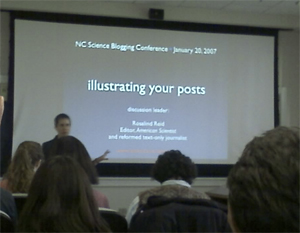 Rosalind Reid “Illustrating Your Posts” |
Then I was off to see Rosalind Reid, Editor for American Scientist, for a session on “Illustrating Your Posts.” Here I learned all about how my habit of taking photos from other sites and posting them on this blog without permission is illegal–just like the banner at the top of this page! Isn’t that interesting? Through the ensuing discussion, I learned of many sources for royalty-free photos or cheap science photos for my blog such as David Goodsell, Howard Hughes Medical Institute, Government Websites, istockphoto, and Cornell’s News Archive.
I followed this by attending a session on “Teaching + Science” hosted by Adnaan Wasey from PBS’s The Online NewsHour,
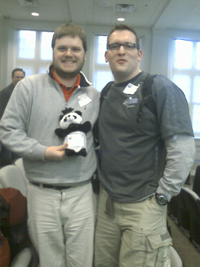 Reed A. Cartwright and Burt Humburg of the Pandas Thumb (don’t know who’s who in this photo) |
which provides online exhibits and lesson plans for educators. An interesting debate broke out early into this session, when Laurence A. Moran of Sandwalk questioned how Newshour knew their reporting was accurate, which led into a brief debate on accuracy in blogging. With Dr. Moran taking the position that blogging hasn’t been all good because we have people posting on topic outside of their realm of expertise (cough. cough.) and there’s no accountability. The guys from Pandas Thumb took the counterpoint that we can’t get so wrapped up in accuracy that we don’t produce anything. It provided a great deal of food for thought that I will put into a blog post somewhere down the line.
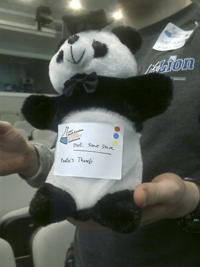 Professor Steve Steve of the Pandas Thumb |
The session continued with bloggers and public school teachers exchanging links. Here I learned about such online resources as
NCSU’s Science House educational outreach organization,
The Globe Programme “linking students and scientists in 109 countries,” and Verizon’s